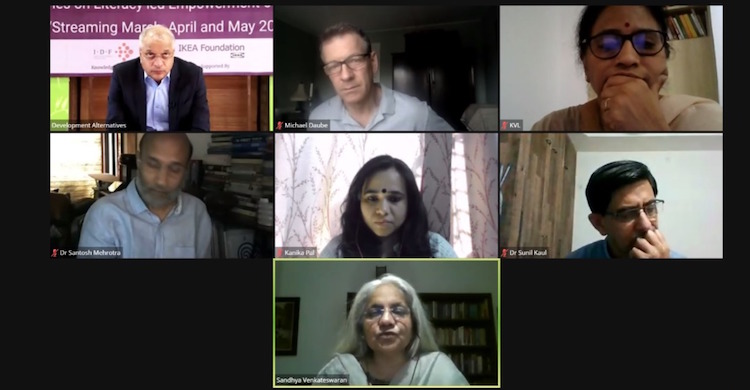Women are Crucial Healthcare Providers to Families: With High ‘Health Literacy’ They Could Navigate a Pandemic Successfully: DA Webinar

A quarter of Indian women are not regularly exposed to any media and 27% do not read any newspaper or magazine. Only 21% use mobile internet and 37% do not own mobile phones. During a pandemic of devastating spread and scale, they have no way to educate themselves or their families about prevention, remedies or life-saving healthcare. During a webinar on “Literacy: A Prescription for Positive Health Outcomes” speakers underlined the need to increase Health Literacy among Indian women, especially in the rural areas, where the literacy rate is as low as 60% as in Bihar and 63% in UP. A health aware woman can not only look after the family, but the entire community in the Indian context and the continuing Covid19 Pandemic.
Sandhya Venkateswaran, a fellow at Lancet’s Citizen’s Commission on Reimagining India’s Health Systems, highlighted the link between literacy and health outcomes, especially in times of Covid19 emergency. “Health literacy is an extremely important tool for building human capital in India”, she said. “When women, the care provider of the family, is illiterate it creates obstacles to access healthcare for all. The gender gap that exists in illiteracy and health literacy has created huge barriers and investments in this area are critical”, said Kanika Pal, South Asia Head for Community Investments and Sustainability Programmes at Hindustan Unilever. Corporate support for community programmes on health awareness are not enough, said Prof Santosh Mehrotra, visiting professor at Centre for Development of University of Bath, UK and former professor of economics at Delhi’s Jawaharlal Nehru University. “There is massive evidence that states like Kerala and Tamil Nadu who have invested in women literacy have scored higher on women’s welfare, social development goals and overall GDP, while states like UP and Bihar have an abysmal record.” Governments have to primarily think of health and education spends as “an investment centre not as a cost centre”, he added, pointing out that in the last 6 to 7 years, budgetary allocation on both have showed little growth if any at all.

.jpeg )
Sandhya Venkateswaran, a fellow at Lancet’s Citizen’s Commission on Reimagining India’s Health Systems, highlighted the link between literacy and health outcomes, especially in times of Covid19 emergency. “Health literacy is an extremely important tool for building human capital in India”, she said. “When women, the care provider of the family, is illiterate it creates obstacles to access healthcare for all. The gender gap that exists in illiteracy and health literacy has created huge barriers and investments in this area are critical”, said Kanika Pal, South Asia Head for Community Investments and Sustainability Programmes at Hindustan Unilever. Corporate support for community programmes on health awareness are not enough, said Prof Santosh Mehrotra, visiting professor at Centre for Development of University of Bath, UK and former professor of economics at Delhi’s Jawaharlal Nehru University. “There is massive evidence that states like Kerala and Tamil Nadu who have invested in women literacy have scored higher on women’s welfare, social development goals and overall GDP, while states like UP and Bihar have an abysmal record.” Governments have to primarily think of health and education spends as “an investment centre not as a cost centre”, he added, pointing out that in the last 6 to 7 years, budgetary allocation on both have showed little growth if any at all.

Latest Videos
















